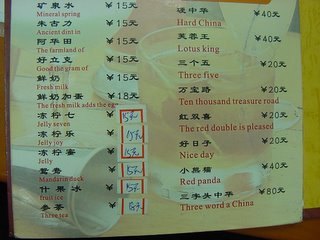What you are going to read maybe offending. But for the sake of freedom of speech and writting (typing, in this case) somebody's going to publish it.
just keep your finger crossed that i will not be killed from this day after...

Here's the article....
Your Taboo, Not Mine
The furor over cartoons of Muhammad reveals the zealot's double standard
Feb. 13, 2006
The iconic image of last week was in the Gaza Strip. It was of a Palestinian gunman astride the local office of the European Union. All the diplomatic staff had fled, tipped off ahead of time. The source of the militant's ire? A series of satirical cartoons originally published in Denmark. Yes, cartoons.
A Danish paper, a while back, had commissioned a set of cartoons depicting the fear that many writers and artists in Europe feel when dealing with the subject of Islam. To Western eyes, the cartoons were not in any way remarkable. In fact, they were rather tame. One showed Muhammad with his turban depicted as a bomb--not exactly a fresh image to describe Islamic terrorism. Another used a simple graphic device: it showed Muhammad surrounded by two women in full Muslim garb, their eyes peering out from an oblong space in their black chadors. And on Muhammad's face there was an oblong too, blacking out his eyes. The point was that Islam has a blind spot when it comes to women's freedom. Crude but powerful: exactly what a political cartoon is supposed to be.
The result was an astonishing uproar in the Muslim world, one of those revealing moments when the gulf between our world and theirs seems unbridgeable. Boycotts of European goods are in force; demonstrators in London held up signs proclaiming EXTERMINATE THOSE WHO MOCK ISLAM and BE PREPARED FOR THE REAL HOLOCAUST; the editor of the French newspaper France-Soir was fired for reprinting the drawings; Afghan President Hamid Karzai condemned the publication; and protesters set fire to the Danish and Norwegian embassies in Damascus. The Egyptian ambassador to Denmark expressed disbelief that the government would not prevent further reprinting. Freedom of the press, the Egyptian explained, "means the whole story will continue and that we are back to square one again. The government of Denmark has to do something to appease the Muslim world."
Excuse me? In fact, the opposite is the case. The Muslim world needs to do something to appease the West. Since Ayatullah Khomeini declared a death sentence against Salman Rushdie for how he depicted Muhammad in his book The Satanic Verses, Islamic radicals have been essentially threatening the free discussion of their religion and politics in the West. Rushdie escaped with his life. But Pim Fortuyn, a Dutch politician who stood up against Muslim immigrant hostility to equality for women and gays, was murdered on the street. Theo van Gogh, a Dutch filmmaker who offended strict Muslims, was killed thereafter. Several other Dutch politicians who have dared to criticize the intolerance of many Muslims live with police protection.
Muslim leaders say the cartoons are not just offensive. They're blasphemy--the mother of all offenses. That's because Islam forbids any visual depiction of the Prophet, even benign ones. Should non-Muslims respect this taboo? I see no reason why. You can respect a religion without honoring its taboos. I eat pork, and I'm not an anti-Semite. As a Catholic, I don't expect atheists to genuflect before an altar. If violating a taboo is necessary to illustrate a political point, then the call is an easy one. Freedom means learning to deal with being offended.
Blasphemy, after all, is commonplace in the West. In America, Christians have become accustomed to artists' offending their religious symbols. They can protest, and cut off public funding--but the right of the individual to say or depict offensive messages or symbols is not really in dispute. Blasphemy, moreover, is common in the Muslim world, and sanctioned by Arab governments. The Arab media run cartoons depicting Jews and the symbols of the Jewish faith with imagery indistinguishable from that used in the Third Reich. But I have yet to see Jews or Israelis threaten the lives of Muslims because of it.
And there is, of course, the other blasphemy. It occurred on Sept. 11, 2001, when fanatics murdered thousands of innocents in the name of Islam. Surely, nothing could be more blasphemous. So where were the Muslim boycotts of Saudi Arabia or Afghanistan after that horrifying event? Since 9/11 mosques have been bombed in Iraq by Islamic terrorists. Where was the rioting condemning attacks on the holiest of shrines? These double standards reveal something quite clear: this call for "sensitivity" is primarily a cover for intolerance of others and intimidation of free people.
Yes, there's no reason to offend people of any faith arbitrarily. We owe all faiths respect. But the Danish cartoons were not arbitrarily offensive. They were designed to reveal Islamic intolerance--and they have now done so, in abundance. The West's principles are clear enough. Tolerance? Yes. Faith? Absolutely. Freedom of speech? Nonnegotiable.
> Visit Andrew Sullivan's blog, the Daily Dish, at time.com
Whose fault is it? The cartoon? The press? The people? The third world's mindset? History has showed us that every war ends on the round table. Can we all just behave like a civilised human being. Can we all just die with old age, and not because of war? (hahah)















